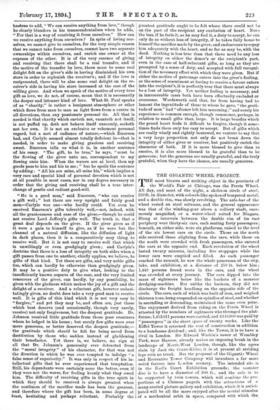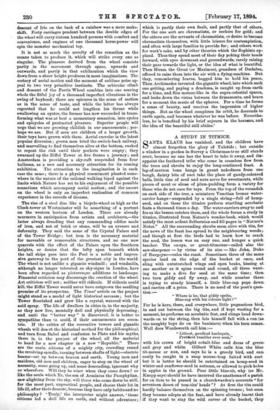THE GIGANTIC WHEEL PROJECT.
THE most bizarre and striking object in the precincts of the World's Fair at Chicago, was the Ferris Wheel. All day, and most of the night, a skeleton circle of steel. 250 ft. in diameter, with cobweb-like spokes of tempered metal, and a double rim, was slowly revolving. The axle-bar of the wheel rested on steel columns, and the general appearance was that of the winding-gear above a colliery shaft, enor- mously magnified, or a water-wheel suited for Niagara. Slung at intervals between the double rim of its vast periphery were thirty-six cars, each seating forty passengers ; beneath, on either side, were six platforms, raised to the level of the six lowest care on the circle. Those on the north side received those alighting from the cars, while those on the south were crowded with fresh passengers, who entered the cars at the opposite end. Each revolution of the wheel lasted twenty minutes, including five stoppages while the lower cars were emptied and filled. As each passenger reached the summit, he saw the whole panorama of the city, lake, and exhibition, at a distance of 250 ft. below him ; 1,440 persons found seats in the cars, and the wheel was crowded at every journey. The cars dipped into the mass of sightseers below like the buckets of a monster dredging-machine. But unlike the buckets, they did not discharge the freight headlong on the opposite side of the circle. The cars, each of which was built of iron, and weighed thirteen tons, hung suspended on spindles of steel, and whether in ascending or descending, maintained the same even poise. The enjoyment derived from riding on the Ferris Wheel is attested by the numbers of sightseers who thronged the plat- forms ; 1,453.611 persons were carried, and £140,000 was paid by " passengers " in the short space of twenty weeks. Like the Eiffel Tower it returned the cost of construction in addition to a handsome dividend ; and, like the Tower, it is to have a rival in London. Sir Edward 'Watkin's tower at Wembley Park, near Harrow, already makes an imposing break in the landscape of North-West London, though, like the ogres slain by Jack the Giant-Killer, it is at present all striding legs with no trunk. But the proposal of the Gigantic Wheel and Recreative Tower Company will introduce a far more weird feature into Lmdon scenery. The intended site is in the Earl's Court Exhibition grounds ; the monster disc is to have a diameter of 300 ft., and the axle is to be supported by twin towers, which will combine the pro- portions of a Chinese pagoda with the attractions of a many-storied picture-gallery and exhibition, which it is antici- pated will be all the more enjoyed after the mental stimulus of a mechanical orbit in space, compared with which the descent of Iris on the back of a rainbow was a mere make- shift. Forty carriages pendent between the double edges of the wheel will carry sixteen hundred persons with comfort and convenience, and engines of one thousand horse-power will spin the monster mechanical toy.
It is not so much the novelty of the sensation as the means taken to produce it, which will strike every one as singular. The pleasure derived from the wheel consists partly in the movement through space, upwards and outwards, and partly in that exhilaration which the view down from a sheer height produces in most imaginations. The ecstacy of aerial motion and the moment of sublime poise ap- peal to two very primitive instincts. The orbicular climb and descent of the Ferris Wheel combine into one soaring whole the fitful joy of a thousand imperfect vibrations in the swing of boyhood; there are epicures in the sense of motion as in the sense of taste, and, while the latter has always regretted that he could not lengthen his throat while swallowing an oyster, the former has now succeeded in trans- forming what was at best a momentary sensation, into cycles and epicycles of protracted pleasure. Superior people will urge that we are growing childish in our amusements ; per- haps we are. But if men are children of a larger growth, their toys have grown with them. Aerial exercise is the latest popular diversion ; grown men tried the switch-back railway, and marvelling to find themselves alive at the bottom, rushed to repeat the risk until their pockets were empty ; they swarmed up the Eiffel Tower at five francs a journey ; and Amsterdam is providing a sky-raft suspended from four balloons, as a new and necessary attraction for its coming exhibition. The attraction to the imagination is in each case the same ; there is a physical resentment planted some- where in the nature of the rational walking biped against the limits which Nature has set to his enjoyment of the possible sensations which accompany aerial motion; and the ascent on the wheel is only an imperfect realisation of common experience in the records of dreams.
The rise of a steel disc like a bicycle-wheel as high as the Clock-tower at Westminster will be something of a portent on the western horizon of London. There are already murmurs in anticipation from artists and architects,—the latter always dreading that any commanding edifice made of iron, and not of brick or stone, will be an eyesore and deformity. They said the same of the Crystal Palace and of the Tower Bridge ; but iron is the necessary material for moveable or removeable structures, and no one now quarrels with the effect of the Palace upon the Southern heights, or denies that the lofty span beneath which the tall ships pass into the Pool is a noble and impres- sive gateway to the port of the greatest city in the world. The wheel is not unlike a gigantic windmill ; and windmills, although no longer tolerated as sky-signs in London, have been often regarded as picturesque additions to landscape. Financial criticism may discourage the erection of the wheel. Art criticism will not ; neither will ridicule. If ridicule could kill, the Eiffel Tower would never have outgrown the seedling promise of its prospectus. The Times' article on the project might stand as a model of light historical sarcasm ; but the Tower flourished and grew like a crystal, watered with the acid spray. The life of dwellers in cities is, to the majority, as they now live, mentally dull and physically depressing ; and until the "better way" is discovered, it is better to sympathise than to scold, if their amusements are eccen- tric. If the critics of the recreative towers and gigantic wheels will desert the historical method for the philosophical, and turn from Babel and confusion to Plato and his myths, there is, in the project of the wheel, all the material to hand for a new chapter in a new "Republic." There are the souls, citizens of a mighty city, crowding round the revolving spindle, turning between shafts of light—electric beams—set up between heaven and earth. Young men and maidens, old men and children, eager to step on the wheel of necessity, some going up, and some descending, ignorant why or wherefore. Will they be wiser when they come down ? or like the souls which Er, the son of Arminius the Pamphylian, saw alighting from the sky, will those who come down be still, for the most part, unpractical people, and choose their lot in life ill, after their descent, because they have only habits and no philosophy ? Truly,' the interpreter might answer, these citizens led a dull life on earth, and without adventure ; which is partly their own fault, and partly that of others. For the one sort are chrematists, or seekers for gold; and the others are the servants of chrematists, or desire to become chrematists themselves, with little leisure for contemplation, and often with large families to provide for ; and others work for work's sake, and by other theories which the Sophists ap- plaud. Thus they spend most of their day poking their heads forward, with eyes downcast and groundwards, rarely raising- their gaze towards the light, or the idea of what is beautiful. Then Hiram the Great (or Maximus), grandson of Daadalus, offered to raise them into the air with a flying-machine. But they, remembering Icarus, begged him to hold his peace. Then Archimedes invented the gigantic wheel, into which each one getting, and paying a drachma, is caught up from earth- for a time, and flies meteor-like in the supra-celestial spaces, and looks down the vistas between the firmaments, and hears- for a moment the music of the spheres. For a time he forms a sense of beauty, and receives the impression of higher things. But as the wheel completes its orbit, he descends to earth again, and becomes whatever he was before. Neverthe- less, he is benefited by his brief sojourn in the heavens, and the idea of the beautiful still abides.'







































 Previous page
Previous page